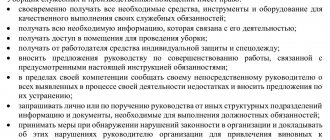The main responsibilities of an archivist in an archive/enterprise
Key functional responsibilities of an archivist include the following:
- carries out archival work at the enterprise;
- organizes storage and ensures the safety of documents received in the archive;
- accepts and registers documents received for storage from structural divisions that have been completed by office work;
- participates in the development of case lists, checks the correctness of formation and execution when transferring them to the archive;
- in accordance with current rules, encrypts storage units, systematizes and places files, and keeps records of them;
- prepares summary inventories of units of permanent and temporary storage periods, as well as acts for the transfer of documents for state storage, for the write-off and destruction of materials whose storage periods have expired;
- works to create a reference apparatus for documents, ensures convenient and quick search for them;
- participates in the work of examining the scientific and practical value of archival documents;
- monitors the condition of documents, the timeliness of their restoration, and compliance in the archive premises with the conditions necessary to ensure their safety;
- monitors compliance with fire protection rules in the archive premises;
- issues archival copies and documents in accordance with incoming requests, compiles the necessary certificates based on the information available in the archive documents;
- prepares data for reporting on the work of the archive;
- takes the necessary measures to use modern technical means in work.
What is an archivist?
An archivist (archivist) is an archive employee, or, in a broader sense, a custodian of documents. The archival fund of Russia includes both state and non-state archives; in this case, state ones can be divided into:
- to federal archives;
- archives of the subjects of the Federation;
- archives of various departments.
Due to the fact that many documents accompanying the business activities of any organization (tax reports, orders, accounting documents, office work documents, etc.) require preservation for a certain period of time, private companies may also require a specialist who can organize the work of the archive and systematize the document flow in it. This is exactly what an archivist does.
Thus, he can be an employee of both a state (budgetary) institution and a private enterprise. In particular, archivists are quite in demand in insurance and financial companies, banks, and state-owned enterprises. Such diversity significantly affects the range of job responsibilities of a specialist, and therefore the content of the job description in each specific case.
Knowledge requirements
Here's what an archivist should know:
- regulatory legal acts, regulations, instructions, other guidance materials and documents on archival management at the enterprise;
- the procedure for receiving and submitting documents to the archive, their storage and use;
- legal requirements for the records management system;
- the procedure for drawing up descriptions of documents of permanent and temporary storage and acts of destruction of documents;
- the procedure for registering files and preparing them for storage and use;
- the procedure for maintaining records and reporting;
- enterprise structure;
- basics of labor organization;
- rules for operating technical equipment;
- basics of labor legislation;
- internal labor regulations;
- rules and regulations of labor protection.
Document composition options
The current labor law standards do not contain guidelines for drawing up job descriptions. As a guide, you can use suitable professional standards recommended for use in Articles 195.1-195.3 of the Labor Code. For the profession of an archivist, you can use the standards of a clerk (07.002) and an archive specialist (07.009). Since these professional standards are mostly advisory in nature, employers can adapt their content to suit themselves, taking into account their own characteristics.
When writing instructions, it is recommended to apply certain rules, including those regarding the form of the document. An example typical structure looks like this:
- A common part.
- Responsibilities of a specialist.
- His labor rights.
- Responsibility for violations.
If the employer is a large company focused on formalizing its relations with employees, then other parts can be added:
- Features of official relationships.
- Working conditions for a specialist.
- The parameters by which the results of his work are assessed.
Attention! The formatting of the instructions must comply with the standards of official documentation. It must contain the date of writing, basic details of the employing company, etc. It is recommended to print it out on the company’s official letterhead.
General section
An introductory part dedicated to describing the basic aspects of the employee’s activities. It contains:
- the procedure for his hiring and dismissal;
- the procedure for its temporary replacement;
- the skills he must possess;
- qualification standards.
The required skills, education and experience of the specialist must ensure the performance of job functions, which are described in the next part.
Attention! Since the instructions are considered an addition to the employment contract, the parameters described in its sections should not contradict the content of this contract or go beyond its boundaries.
Responsibilities
While the primary responsibilities of an archivist rarely change, secondary responsibilities can vary significantly from company to company. In addition to maintaining an archive, a specialist may be entrusted with translating papers into electronic form, participating in document examinations, etc. All these differences are determined by the specifics of the employing enterprise: its size, organizational structure, field of activity and other factors.
Traditionally, the employee’s obligation to comply with the rules of labor discipline and fire (technical) safety is separately prescribed.
Attention! If the employer has many employees with their own personalized job descriptions, it is recommended to approve a separate regulation that prescribes the algorithm for their acceptance, adjustment and other actions.
Rights
Here is a list of rights that a specialist has. This list should not copy the one given in Art. 21 TK. Rather, this list can be considered as additional rights granted by the employer to the specialist. So, here you can prescribe the opportunity to receive certain benefits at the expense of the employer.
Responsibility
The list of violations and penalties is prescribed in a general form. A certain responsibility of the employee occurs only after the completion of administrative and legal procedures, possibly even completed in court. In this section, you can expand the list of violations by mentioning responsibility for missing deadlines, ignoring the parameters for handling documents, etc. In general, this part plays rather a disciplinary role, encouraging the employee to be more attentive to his duties.
The job description, after its initial drafting, must be demonstrated to relevant specialists. Typically, this process involves a lawyer, a human resources officer, and the head of the relevant department. After taking into account their adjustments, the document is sent to the head of the organization. The specialist himself gains access to it during his employment. To put the instruction into force, it must be signed by all parties: the specialist himself, the director of the organization, as well as other people who participated in its preparation.
Job description of an archive worker - archivist
Each company has its own archive of documents, which is subject to careful control. The most important materials are stored in the archive for quite a long time. In order for valuable information to be systematized and stored in accordance with instructions and regulations, the company employs a person whose profession is called an archivist.
Responsibilities and tasks
An employee working in an archive must have a certain set of qualities that characterize him as a professional in his field. At first glance, the work may seem simple, but in fact, the archivist has a very wide range of responsibilities. These include:
- systematization and selection of documentation;
- acceptance and processing of documents for storage;
- preparation of certificates for documents;
- transfer of documents to the storage of government agencies;
- maintaining the organization's records;
- storage of documents until their expiration;
- control over the use of archival materials;
- compiling and filling a documentation database;
- accounting of all documents and other papers received in the archive;
- placement of cases;
- control over the status of documentation;
- restoration of lost documents.
The tasks of an archivist include organizing the storage of documentation and its registration. The archive worker also makes an inventory of all documents. Job responsibilities include:
- participation in examinations;
- compliance with fire safety rules;
- issuing copies of documents upon incoming requests.
Basic provisions of the instructions
The job description of an archivist in different organizations may differ, it all depends on how the head of the company sees the activities of this person. However, as a rule, the following points are repeated in most instructions.
The archivist must know:
- regulations and instructions relating to archiving in the organization;
- organization structure;
- the procedure for accepting and transferring documents for storage;
- rules for using documents;
- office management system;
- regulatory legal acts on archival matters;
- labor regulations;
- rules for using technical means;
- reporting rules;
- labor legislation;
- procedure for drawing up acts of destruction of documentation;
- rules for compiling an inventory;
- fire safety rules.
In addition to duties, the archivist also has rights.
These include:
- familiarization with the decisions of the organization’s management that relate to its activities;
- requesting documents that are necessary to perform his duties;
- requesting information related to his direct activities;
- reporting deficiencies in the organization’s work identified in the process of performing its work;
- representing the interests of the company;
- failure to perform work if there is a threat to health or life;
- signing documentation within the scope of their duties;
- Maintaining communication with employees of the organization on work issues.
For improper work, the archivist bears responsibility, which is provided for by labor legislation in the Russian Federation . For offenses committed in the course of work, the archivist bears responsibility as provided for in the criminal, administrative or civil codes of the Russian Federation. Liability for causing material damage is provided for in labor and civil legislation.
Responsibility may arise for:
- poor performance of one's duties;
- disclosure of information that is a trade secret;
- disclosure of information that is a state secret;
- violation of the internal regulations of the organization;
- violation of business etiquette;
- disclosure of confidential information;
- damage to the enterprise;
- fire safety violation;
- sending false information to the manager or archive manager;
- violations of the regulations and instructions of the enterprise.
Criteria for evaluating the work of an archivist include:
- maintaining discipline at the enterprise;
- high-quality performance of your work;
- timely performance of duties.
The work of the archivist is assessed by the senior management of the archive department.
Requirements for an archivist. What should he know?
An archivist is related to the technical profession. An archive worker can be a person who has a specialized education in the specialty “archival business” or “clerical work” . An archival specialist must have certain qualities:
- be attentive and pedantic;
- have perseverance and patience;
- be responsible and organized;
- have discipline and calmness;
- be careful and focused;
- have fine manual motor skills;
- have good knowledge of the Russian language;
- have the ability to analyze information.
And also the archivist must have a good memory , have increased attention to detail, be able to perceive a large amount of information, and be punctual. An archive employee must be willing to do monotonous work for a long time.
The main requirements for a person working in the archive are:
- ability to work with organizational technology;
- knowledge of computer basics;
- written and oral literate speech;
- knowledge and compliance with the legislation of the Russian Federation, regulations and instructions on archival matters;
- ability to work with a huge flow of information;
- experience;
- in some cases there is an age limit.
In addition, the archivist must periodically undergo professional training to improve his level of knowledge. On-the-job training is a thing of the past. You can study in a master's program. It will allow you to obtain a master's degree in archival science, improve your knowledge and skills in working with archival documents. In the future, this will allow you to apply for a higher position, become a deputy or head of the archive.
An archivist should have no medical contraindications for working in an organization’s archive. Contraindications include:
- diseases of the musculoskeletal system;
- visual impairment;
- nervous and mental diseases;
- allergy to dust;
- drug and alcohol addiction;
- diseases of the hearing aid;
- speech-related diseases;
- loss of consciousness;
- epileptic seizures;
- skin diseases;
- convulsions;
- impaired coordination of movements;
- infectious diseases.
Which companies need such an employee?
In the Russian Federation there are archives of federal significance, archives of the constituent entities of the Federation and departmental archives. They can work in government agencies, for example, in the registry office. In this case, his job will be to record fertility and mortality, store copies of documents and other papers . Employees can also work in museum archives, monitoring and organizing exhibits. Educational institutions also cannot do without an archivist, since they contain a lot of documents from students and employees. In medical institutions, the archivist is responsible for recording and storing medical documentation , cards and medical histories.
In libraries, workers in this profession are also needed. Large factories have their own archives with documents, so such an employee is present there too. Specialists are needed in banks, retail chains, and insurance companies. Individuals can seek the services of archivists, for example, if a family wants to maintain their family libraries and historical records in complete order and control.
Documentation of enterprises must be stored correctly and accurately, and this is what the archivist monitors. He fills them out and places them on shelves and racks for quicker retrieval. The specialist creates electronic databases, catalogs and fills out the register , thereby simplifying the work for himself and other workers.
Archivists work with a large amount of information and documentation and are the custodians of all securities. They spend little time outdoors, as their work is carried out indoors. The main work uniform is a robe. Archive workers celebrate their professional holiday on March 10.
The video contains interesting information about the profession of Archivist.
Who should develop the instructions?
The list of responsibilities, rights and main functions of employees are reflected in many documents. One of them is the job description. As a rule, it is developed by a legal adviser and an employee of the human resources department and approved by the head of the enterprise.
Then the person hired for the position is given the opportunity to familiarize himself with the document (the fact is confirmed by a personal signature) and is handed over when signing the employment contract.
The job description of an archivist is an internal local act of the enterprise. The regulations on the structural unit are the basis for its development. When compiling we also use:
- Unified qualification directory of employee positions.
- National classifier.
- Labor Code of the Russian Federation.
Professional standard - what is it?
The professional standard 2020 is a qualification characteristic. Which is necessary for an employee to be able to work in a certain profession.
This concept includes requirements for skills and abilities.
also work experience.
Popular materials in this section
Application to the court to expedite the consideration of a criminal case
How long is a medical certificate valid when applying for a license?
Will the pension of a working pensioner be recalculated after dismissal?
Why do Russian Railways employees retire earlier?
Is it possible to cancel a deed of gift during your lifetime?
Payment of utilities for the homeowners association
Profstandart
To date, a professional standard has been developed for archive workers, approved by Order of the Ministry of Labor and Social Protection of the Russian Federation dated April 19, 2018 No. 266n for the “Specialist in the formation of an electronic archive” - code 07.009.
The definition of the concept of professional standard is contained in the text of Federal Law dated December 3, 2012 No. 236-FZ.
According to the document, this is a qualification characteristic that is necessary for an employee to perform a certain type of professional activity, including the performance of an established job function. An employee’s qualifications mean a certain level of professional knowledge, abilities, skills and experience.
The document contains detailed information about:
- features of the profession;
- content of work;
- specialist knowledge;
- his responsibilities, etc.
According to the professional standard, the functions of an archivist form an integral, complete, autonomous system, and this profession is considered a unit of the leadership unit, with its inherent responsibilities and powers.
The type of activity is manual and mainly requires being indoors. The archivist carries out the same type of work, performs standard tasks according to the established pattern, observing norms, rules and instructions.
The main task of the employee is to systematize and record various materials and documents. An archivist is able to work in his specialty in archival departments and institutions of city, regional or national significance and other institutions and services that deal with archival matters (private or departmental).
The archivist must own:
- knowledge in the field of legal documentation used in the work;
- the procedure for receiving, issuing, storing and using papers;
- inventory writing skills, etc.
Professional standard archivist from July 1, 2020
Professional standards in the section “Characteristics of generalized labor functions” often indicate several options for job titles for the employer to choose from.
That is, in case of identified discrepancies, the employer needs to review the staffing table and make changes to the employment contract and the employee’s work book.
5. After identifying “native” professional standards, identifying and processing additional work, and deciding on renaming the position, the employer will already be able to see the employee’s qualification level and, accordingly, the qualification requirements for this position.





